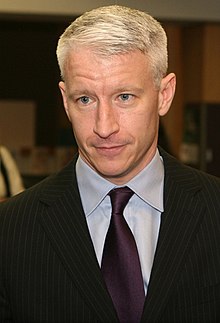 It’s easy to be a little cynical about the news today that Anderson Cooper has confirmed, “the fact is, I’m gay.” His endearing and interesting letter to Andrew Sullivan, who seems to have been out since the moment he burst onto the U.S. journalism scene, demonstrates not so much the painful and heartbreaking story of a closeted journalist, but instead someone who has just had enough with the rumors and innuendo and decided it was time to be honest with the public . . . in the interest of the public.
It’s easy to be a little cynical about the news today that Anderson Cooper has confirmed, “the fact is, I’m gay.” His endearing and interesting letter to Andrew Sullivan, who seems to have been out since the moment he burst onto the U.S. journalism scene, demonstrates not so much the painful and heartbreaking story of a closeted journalist, but instead someone who has just had enough with the rumors and innuendo and decided it was time to be honest with the public . . . in the interest of the public.
It’s become clear to me that by remaining silent on certain aspects of my personal life for so long, I have given some the mistaken impression that I am trying to hide something – something that makes me uncomfortable, ashamed or even afraid. This is distressing because it is simply not true.
I’ve also been reminded recently that while as a society we are moving toward greater inclusion and equality for all people, the tide of history only advances when people make themselves fully visible.
In his letter, Cooper explains why he hasn’t talked about being gay before and why he was concerned that being openly gay would suggest that he could not be seen as objective. What he doesn’t mention is the oft-repeated concern by television journalists that they could lose viewers or harm their employer by being openly LGBTQ. There is important progress in that.
In reaction to the announcement, NLGJA said on its Facebook page:
NLGJA appreciates Anderson Cooper’s honesty and his decision to publicly come out. Our members share his sentiment that as journalists, not activists, we have a significant role to play as advocates for fair & accurate coverage of the LGBTQ community in the mainstream media. We have worked hard to ensure that all journalists are comfortable being out in the newsroom and having it not be perceived as detrimental to their ability to do their job.
It’s important to remember that while there has been a number of journalists who have come out on national television in the last few years, the numbers are low enough that you can count them on your fingers and still have fingers left to text. The number of openly LGBTQ journalists in-front of the camera in major and smaller markets is still abysmally low, with women doing worse than men. Having a successful journalist like Anderson Cooper come out sends the signal that there may also be room to do it if you are in a top 20 market or in one of the tiniest markets in the country.
Cooper’s announcement also reminds us that maybe there will come a time when journalists–or anyone, for that matter–will not have to choreograph their announcement or worry about how they handle being LGBTQ. That hope, of course, is something we see in the youngest generation of journalists who are open at the beginning of their careers or even before their careers take off.
That message is brought home by the death of Armando Montaño, a student member of NLGJA who was found dead in Mexico City while on an internship with the Associated Press. Montaño, who was supposed to participate in the UNITY Student Project in August, was a member of both NLGJA and NAHJ. Mando represented the next generation of journalists for whom being LGBTQ is not something that needs to be hidden or obsessed about, but instead is just part of who they are as individuals . . . and journalists.
While we can thank Cooper for taking the brave step of coming out and being both a role model and a symbol, we can also thank Montaño for a glimpse into our future when coming-out letters just won’t be necessary anymore.
